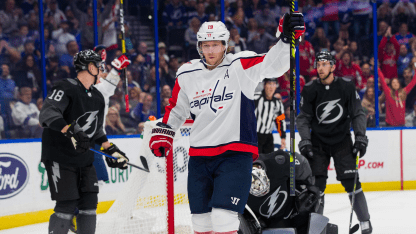Contract negotiations are almost always a tricky and sticky subject in the NHL, particularly in the case of players whose 30th birthdays are in the rear-view mirror. But when team and player enter into those negotiations with similar goals, the process and the journey to a deal can be smoother, and the outcome can be amenable to both sides.
Backstrom Takes Center Stage
Caps and Backstrom come to terms on extension to keep him in DC through the 2024-25 season

Ten years after signing the contract that has carried him through most of his NHL career, Caps center Nicklas Backstrom opted to undertake the negotiations for what will likely be his last big, multi-year pact himself, cutting out the middle man and representing his own interests. It's not a common tack taken in the NHL, but on Tuesday morning we learned that Backstrom and the Capitals were able to strike a deal that will keep the sublime center in Washington for another half decade beyond the current season.
"I think it came up maybe a year ago," says Backstrom, of the idea to represent himself in the negotiations. "First of all, I've been here long enough and I feel like I know the people around the organization, which was a big key, obviously. And I'm interested in this; I think it's pretty cool.
"It's cool to sit face-to-face with a guy, and he'll tell you straight up what he thinks, and I'll tell him straight up what I think. I just think it's a fun process and something I wanted to be a part of. I just didn't want to be on the phone on the other end. I just wanted to see how this is how this process is, and how they're doing it."
The Caps announced that Backstrom and the team have come to terms on a five-year contract that will pay him a total of $46 million, for an average annual salary cap hit of $9.2 million. And the deal got done without any bickering in the media, rancorous or hurt feelings, brinksmanship or any other contract negotiation baggage.
Capitals Re-Sign Nicklas Backstrom
"The negotiation went well," says Caps senior vice president and general manager Brian MacLellan. "Nick was very well prepared. He has done his homework. I know he has whoever he was talking to, so he's getting pretty good information. I think there is a good level of trust between us both. And we had open communication, and we talked about a lot of things. We had several meetings, we exchanged information on a lot of things. I got a good sense of where he was at, and what he wanted to accomplish, and we tried to meet his needs."
A deal got done because of a foundation of mutual respect and trust between Backstrom and MacLellan, and because both sides essentially were desirous of the same outcome, a pact that would keep Backstrom in Washington for the duration of his NHL career.
For the Capitals, this is unique. Scroll down a list of the team's all-time great players, and most either started or ended their careers elsewhere: Mike Gartner, Dennis Maruk, Rod Langway, Scott Stevens, Larry Murphy, Kevin Hatcher, Calle Johansson, Dale Hunter, Olie Kolzig, Peter Bondra, Sergei Gonchar - the list is lengthy. Among players who are no longer active in the league, only two players who played in 500 or more games in a Capitals sweater started and ended their NHL careers here in the District: Bengt Gustafsson and Michal Pivonka.
But among current Capitals, Backstrom, Alex Ovechkin, John Carlson, Braden Holtby, Tom Wilson, Dmitry Orlov and Evgeny Kuznetsov have all been drafted and developed in D.C., and they've spent their whole careers here to date. While it's highly unlikely that all will finish up their respective careers here, Backstrom is certainly an exceptional player, the best center the Caps have ever had, and a virtually certain Hall of Famer.
"In every negotiation, you've got to find a theme or what you want to accomplish, going into it or between the two parties," says MacLellan. "What is it? Is it money oriented? Is it term oriented? Family security oriented? What does the player mean to the team? What will he mean to the team?
"To me, the overriding theme is this: we wanted Nick to finish his career in Washington. He has been a franchise player, and we've had success with him. He's been a big part of us winning the Cup, and has given us over a decade's worth of pretty solid hockey, and the stats all bear it out. So I think the theme for both parties was that we were going to do what we could do to find a place where Nick can finish his career here and feel good about it."
Backstrom was coming at it from a similar starting point.
"I couldn't see myself in another jersey, and thankfully enough, the organization still believes in me and wants me here," says Backstrom. "I think that's one thing that hockey players or hockey organizations are pretty good at, anyway, keeping franchise players around and letting older guys retire there. So hopefully that's the case here."
With that foundation in place, the two sides needed to find common ground on term and average annual value. They got there by using the arbitration principle of comparables.
✍️ #NickysBackhttps://t.co/sVHtsGiSbN pic.twitter.com/IswnjJr1uX
— Washington Capitals (@Capitals) January 14, 2020
"We started with comparables," says MacLellan. "The very first exchange was about guys in similar situations as him, similar producers, centers, franchise defining players. We talked about all those guys. He brought up things - statistics about those players - that he thought were important. And we did the same on our side, too.
"I think it's pretty evident once you pick out the players, and he had certain guys that he felt he compares himself too. And we have certain guys that he might not have included, but we included."
The comparables helped to establish a framework, but there was still work to be done.
"We had several discussions on the aging curve," says MacLellan, "and where he might end up two years from now, three years from now, four years from now, five years from now. And we tried to incorporate that into the negotiation. We both probably had a little bit of a differing opinion on it, on how that plays out. But I guess you never know until the player goes through it, and how it affects him as he gets older in his role on the team, and how the team is doing. We had a few discussions about it."
Ultimately, the Caps decided that they were comfortable with a five-year deal, that Backstrom could be effective through most - if not all - of that term, and that the organization's long-term ability to maneuver its personnel within the parameters of the salary cap would not be severely compromised by such a deal.
"We try and project on how long is Nick going to be a number one center," explains MacLellan, "and to me it's how much your centers play against other teams' top players. In my mind, he's got probably three good years of that left. Those are full value years where he continues to play the way he is right now, that he's one of those guys and then you move on from there. We have Kuznetsov, who should be able to handle some of that load. And we've got [Connor] McMichael coming three or four years from now. So we have options, and we'll let it play out.
"Those are rough projections. I don't know how you totally project; it seems like every year there are issues that come up and things that happen, and you have to deal with the change in projections. But I think it's important to have center depth. We feel good about McMichael coming, we feel good about having Kuzy locked up for term. And we feel good about Nick's new contract."
MacLellan has been down the road before, and recently. He has worked out lengthy deals with Holtby, T.J. Oshie, Wilson, Kuznetsov and Carlson, and is sending a strong signal to Ovechkin - whose 13-year contract expires after the 2020-21 season - that the Caps are serious about keeping the band together, and competing for another Stanley Cup into the middle of this decade.
"There's going to be some pressure points on it with the five-year term," admits MacLellan, "but you do your homework on the aging curve, and what we project him to be at certain levels and at a certain age. The thing with Nick is, it's never been a speed game with Nick. Nick's always been a guy to use his brain more than his legs, and he makes good decisions on the ice. And he makes good decisions positionally; he reads the play. He's always a step ahead. He is a first power play, half wall guy, and he's one of the best in the league.
"Some of those traits, it's not necessarily that age affects them because they're going to be there. I think his hands will be there. I think the ability to run a power play will be there. There is 5-on-5, and reading the play, and being smart, and long as we can get him some speed on the wings, I think he's still going to be an effective player as he ages. He is good in his own end, positionally. I think the idea of giving term has some points that you can make that he is going to play it out at a high level."
April 9, 2010: Backstrom’s 100th point of the season comes on Ovechkin’s 50th goal#ALLCAPS #NickysBack pic.twitter.com/qJRtewJBvv
— Washington Capitals (@Capitals) January 14, 2020
No deal gets done in a vacuum, and NHL rosters are comprised of 20-23 players. Complicating matters is the league's salary cap system, which was installed after a lockout and a year of labor strife gutted the entire 2004-05 NHL season. And since the advent of the cap a decade and a half ago, the parameters of the cap have become more stringent and more restrictive. Even if Backstrom wanted another 10-year deal, it's no longer possible. The longest contract a player can sign is eight years in length, and that's only the case for contract extensions with the same club. Free agents are limited to seven-year maximum deals.
Both Backstrom and Holtby's current contracts expire at the end of this season, and it was always going to be a tight squeeze to get one or both of them extended for a number of years, but MacLellan deftly created some salary cap space last June when he swapped defenseman Matt Niskanen to Philly for Radko Gudas, a deal that cleared a few million in cap space.
Backstrom's current deal carries a $6.7 million cap hit, and it's been one of the most team-friendly contracts in the game for a number of years now. The new five-year deal is a raise of $2.5 annually against the cap, which is easily covered by last year's Niskanen trade.
Additionally, the Caps had no ready replacement plan in place in the event that Backstrom opted to test the free agent market. Future Hall of Fame players biding their time in the AHL and waiting for an opportunity are as rare as polka-dotted unicorns, so getting a deal done with Backstrom was a priority.
In Holtby's case, the Caps have a promising young goaltender already on the roster in Ilya Samsonov, who has been tremendous in his first half season in the league. Washington has drafted and developed quality NHL goaltenders for decades now; the likes of Olie Kolzig (303 NHL wins), Byron Dafoe (171), Jim Carey (79), Semyon Varlamov (228), Michal Neuvirth (105), Philipp Grubuaer (73), Holtby (275) and Samsonov (13) have combined for 1,247 NHL victories and three Vezina Trophies among them, with many more wins to come in the case of those who are still active.
While Washington has no ready replacement for Backstrom, it's not difficult to project the 22-year-old Samsonov as the team's starting netminder going forward in the event that the team is not able to come to terms with an extension with Holtby.
"We had a meeting with Holts just to communicate what we were thinking," says MacLellan, "as far as Nick and him. I mean, the message has been consistent with him, that we're going to play out the year and make decisions after we're done."
That said, the Caps are also committed to not trading Holtby between now and the NHL trade deadline next month.
"The main goal with Holts is that we have a good team, and we have good goaltending," says MacLellan. "We have a young guy that's being developed. He's still our guy. And ideally, we want to have a competitive run down the stretch and into the playoffs and have a lot of fun doing it. So we need two goalies.
"You look at February and March, and how many games we have, we're going to need both goalies playing well. I think that's the model now; it's a two-goalie model. From what I can tell, those are the ones that are working the best, versus paying one goalie and going cheap on the back end. So that's our plan to get through the year, and I think it's a good plan.
"Our goal is to win, and I think our best chance to win is with Holtby, and hopefully Samsonov continues to improve and play well. He's an unproven goalie that's finding his way, and he's done a really good job of handling anything we've thrown at him. It's been impressive. But we're going to need both guys here at their best, both of them, if we want to contend for a championship."
Over the few days, MacLellan and Backstrom finalized the peripheral details, the structure of the signing bonuses, the no-trade protection and other items that neither party is eager to discuss. We wondered whether MacLellan ever gave any thought to negotiating his own deal back in his playing days a few decades ago.
"Back then I think it was a simpler time," says MacLellan. "You probably could have done it a lot easier back then. I mean, the salaries were all within the same range, and you probably had 75% of the labor within the limited range, there's no signing bonus, there's no structure, it's just a number you work out. It would have been easier to accomplish back then. Now it's a little more complicated. There are more issues to deal with, but that makes it fun."
Nicklas Backstrom Press Conference
These negotiations began back in October, and they concluded over the weekend, to the satisfaction of both sides. Backstrom never wanted to play anywhere else, the Caps never wanted him to play anywhere else, and it was important organizationally for the team to do right by one of the greatest players who has come through here in nearly half a century of NHL hockey in D.C.
"I'm happy and hopefully the Caps are happy, too," says Backstrom. "I think we came up with a good number. You could ask Mac what he thinks, but I'm happy about the contract and I'm happy to stay here with this organization. If you put the money part aside, I think it's just meant to be like this, and I'm excited that it turned out this way, and that we actually got it done before the season ended, too, which was a big plus for me."
"I think he really enjoyed it," says MacLellan of Backstrom's first go at hammering out his own contract. "I think he did his homework, he had a general understanding of the process. And as he went through it, he was engaging, it felt like he did his homework quite a bit. In the end, we got it worked out."
More than a few former players have made the post-playing career leap to becoming an agent. Having had the unique experience of successfully negotiating a big deal in the prime of his own career, might Backstrom have an inkling of being an agent himself someday, a decade or so from now?
"No, no, I'm never going to be an agent," replies Backstrom firmly and adamantly. "First of all, I just think I can guide people, but I'm never going to be able to just take a percentage off of the negotiations. I just think with my experience over these many years, for me that was nonsense."
That's fine by MacLellan, who has a few more of these contract extension negotiations on his plate in the not-too-distant future.
"I'm worried about Ovi hiring him," he quips.


















